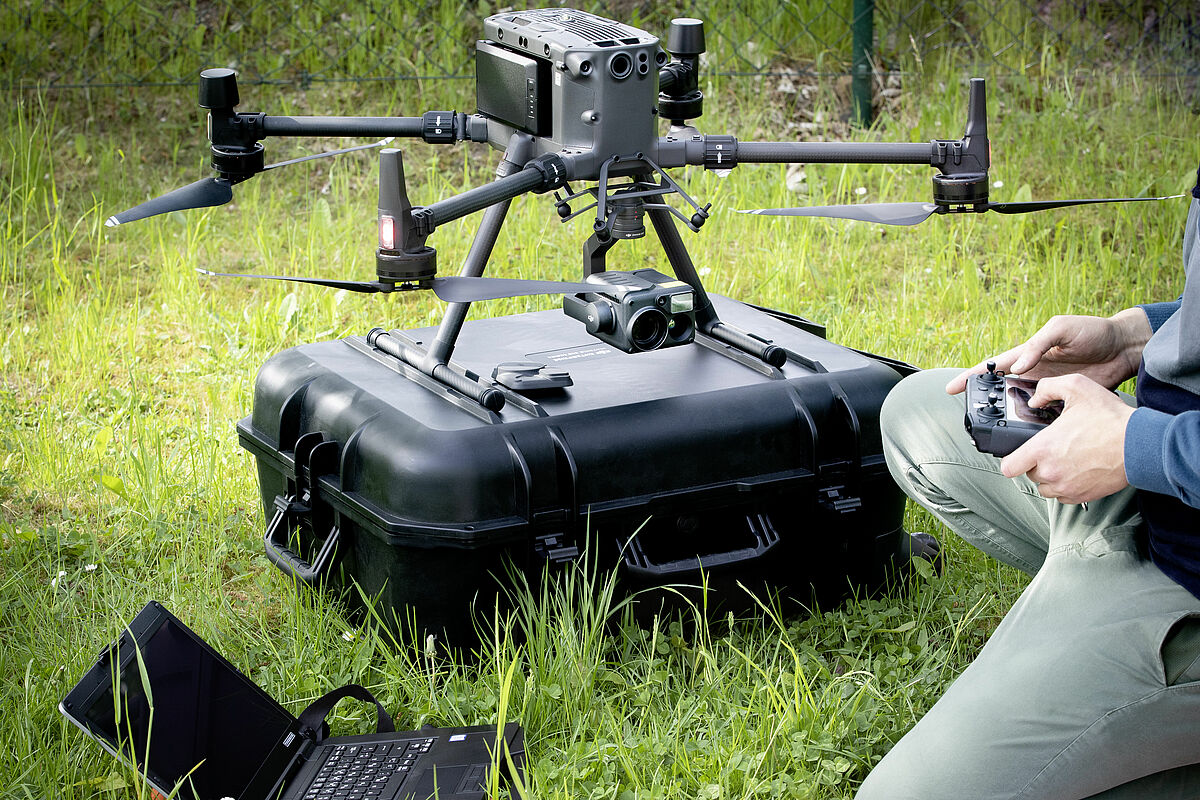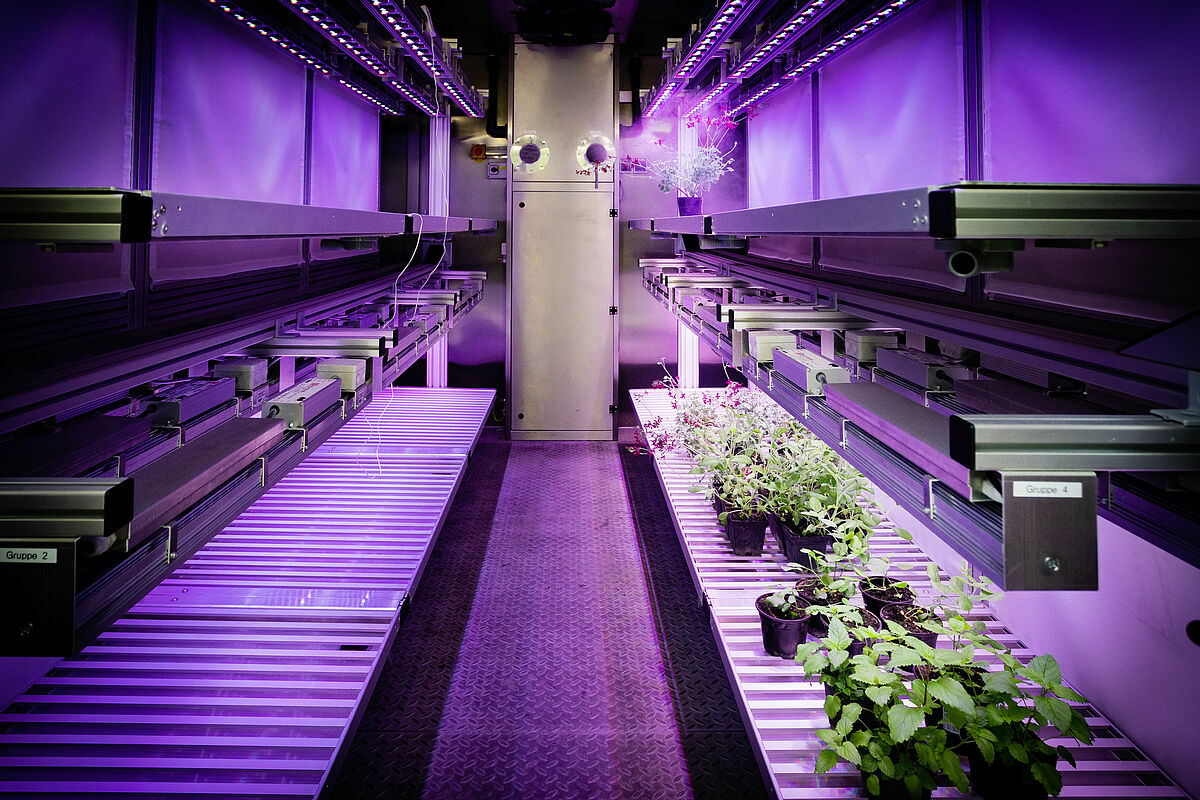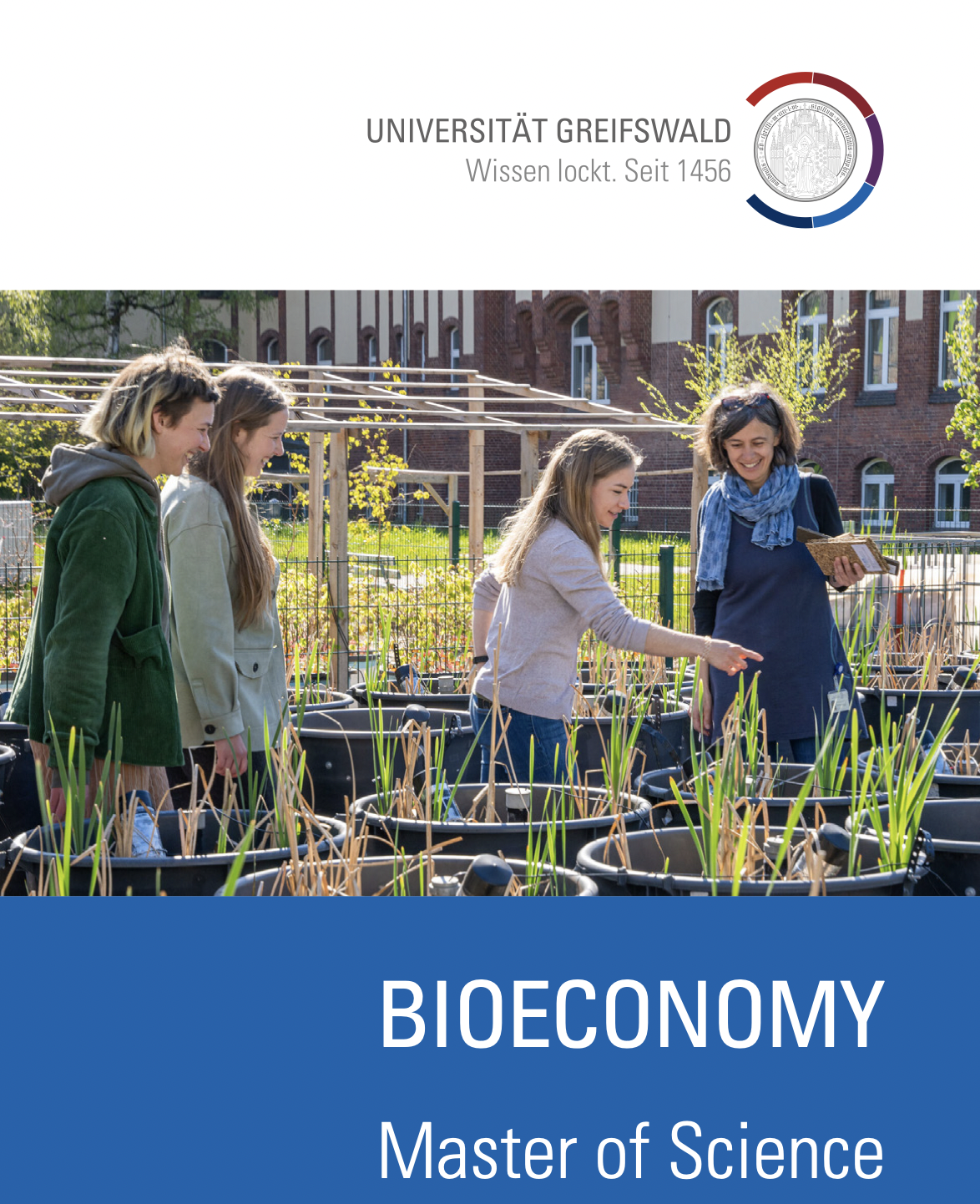Welcome...
... to the website of the Master’s degree course “Bioeconomy”! On this and the following pages you will find all important information regarding the course, documents and admission requirements as well as the teaching staff.
It is still possible to apply and check the admission requirements. Interested parties should send their documents (certificate, transcript of records, application to check the admission requirements) to the program coordinator
(ralf.scheibeuni-greifswaldde) before enrolling.
Advance notice:
At the beginning of the first semester week, there will be a welcoming ceremony for newly enrolled students. Attendance is mandatory.
- Monday, 07.10.2024 at 1 p.m.
- Institute of Geography and Geology, F.-L.-Jahn-Str. 17a, Geology course room (follow the signs)
Please also note the other events during the Freshers' Week at the Institute or at the university.
We look forward to welcoming you!
Bioeconomy is a cross-sectoral economic concept based on biogenic resources from agricultural, forestry and marine products, and on biological and biotechnological processes and knowledge. Bioeconomy aims to increase regional value creation and create a sustainable economy through the application of innovative processes. Bioeconomy goes hand-in-hand with far-reaching transformation processes. It includes the replacement of fossil resources with biogenic, renewable resources, the cascading and co-use of biogenic resources, the increase of biodiversity through diversification of the agricultural, forestry, and marine economy, the ecological compatibility of production by saving resources and minimizing emissions and the promotion of regional development in economic, ecological and social terms.
In the international degree course M.Sc. Bioeconomy students acquire interdisciplinary content-related and methodological competencies with the aim of enabling them to work scientifically and to apply their knowledge in a practical manner in various areas of the life sciences, economics, and regional science. The educational aim of the degree course is not only to deepen existing knowledge from a previous type of degree, but also to gain a broader understanding of the bioeconomy through insights into the various disciplines involved in the bioeconomic transformation.
Students acquire the ability to independently solve complex tasks through a combination of an individually compiled study plan with a variety of elective modules from different subjects of the university. The execution of an interdisciplinary case study in conjunction with the master’s dissertation is intended to offer qualified students the opportunity for career orientation and to open up the possibility of pursuing further research questions, for example in a PhD programme, after obtaining the master’s degree.
The educational goal is to teach fundamental aspects of the bioeconomy with a focus on coastal regions and rural areas in the context of the Baltic Sea region. In the field of natural sciences there is a focus on molecular biotechnology. In addition, relevant topics of marine biotechnology including new utilization concepts of plant biomasses are included. The interdisciplinary and transdisciplinary education is complemented by teaching insights from business, humanities and social science courses. This degree course is designed to teach principles of a biobased sustainable economy and key value chains thereof, as well as to cover fundamentals of business and economic decision-making. Students are encouraged to learn through practical examples the requirements that have to be met for the founding and management of companies, innovations, economic turn-overs and sustainability, as well as being provided with the necessary legal and political background knowledge.
The spectrum of methods offered is adjusted according to individual specialization and prior knowledge and ranges from biotechnological and microbiological laboratory methods to field methods and methods of empirical economic and social research. Skills of interdisciplinary collaboration are developed in the Case Study, in which students with prior knowledge from different subjects work together to solve a practice-based problem. In the master's dissertation, the scientific methodological competence is deepened through the independent processing of a challenging problem. During the professional internship, you will gain insights into professional fields of the bioeconomy. In addition, practical skills for the foundation of an own company will be taught.
The degree course qualifies students for managing challenging analytical work in research and practice with private and public employers as well as for starting their own company. The focus is on research-related preparation of people with specialist expertise and for management positions. In the private sector, students are qualified for jobs in biotechnology in particular, but also in the pharmaceutical and chemical industries as well as in consulting companies. In the public sector, the fields of activity include positions in economic development and regional development as well as in research at universities and non-university analytical institutions. In addition, there are fields of practice in the area of associations, international organizations, and non-governmental organizations.
The program is structured into compulsory modules, personal profiling and elective modules. Integrative and all-embracing perspectives of the bioeconomy are taught as part of the compulsory modules. During Personal Profiling, students receive an individual study plan based on existing knowledge from the preceding bachelor's degree course. Students with a background in natural sciences acquire basic knowledge in business sciences (business administration and economics). Students with a background in economics and social studies acquire basic knowledge in biochemistry/biology. Within the framework of the extensive range of elective modules, an individual focus can be developed. Students will receive advice from us on suitable combinations.
Note: Details can be found in the examination and study regulations with the associated module handbook.
In the Case Study during the third semester, you will be asked to independently prepare a concept and implementation of an interdisciplinary project, in which you solve a practice-oriented problem of the bioeconomy together with other students from different disciplinary backgrounds. You will then prepare a report on the results of the project work. In addition, you will complete an internship of at least eight weeks in Germany or abroad (e.g. in a company, a public authority, a research institution or another institution suitable for the subject). One-semester study programs abroad can also be completed by arrangement.



![[Translate to English:] © Carina Grimm](/storages/uni-greifswald/_processed_/2/e/csm_Gaschromatograph__automatische_Probenaufnahme_ZFF_Grimm_1e5890f090.jpg)
![[Translate to English:] Mikrotiterplatten-Reader [Translate to English:] © Carina Grimm](/storages/uni-greifswald/_processed_/5/9/csm_Mikrotiterplatten-Reader_2_ZFF_Grimm_69e7b4c18f.jpg)

![[Translate to English:] © Carina Grimm](/storages/uni-greifswald/_processed_/b/9/csm_Pilotanlage_Aquaponik_1_ZFF_Grimm_f43f2123ac.jpg)
![[Translate to English:] © Carina Grimm](/storages/uni-greifswald/_processed_/4/7/csm_Pilotanlage_Aquaponik_Sonnentau_ZFF_Grimm_da102223ea.jpg)
